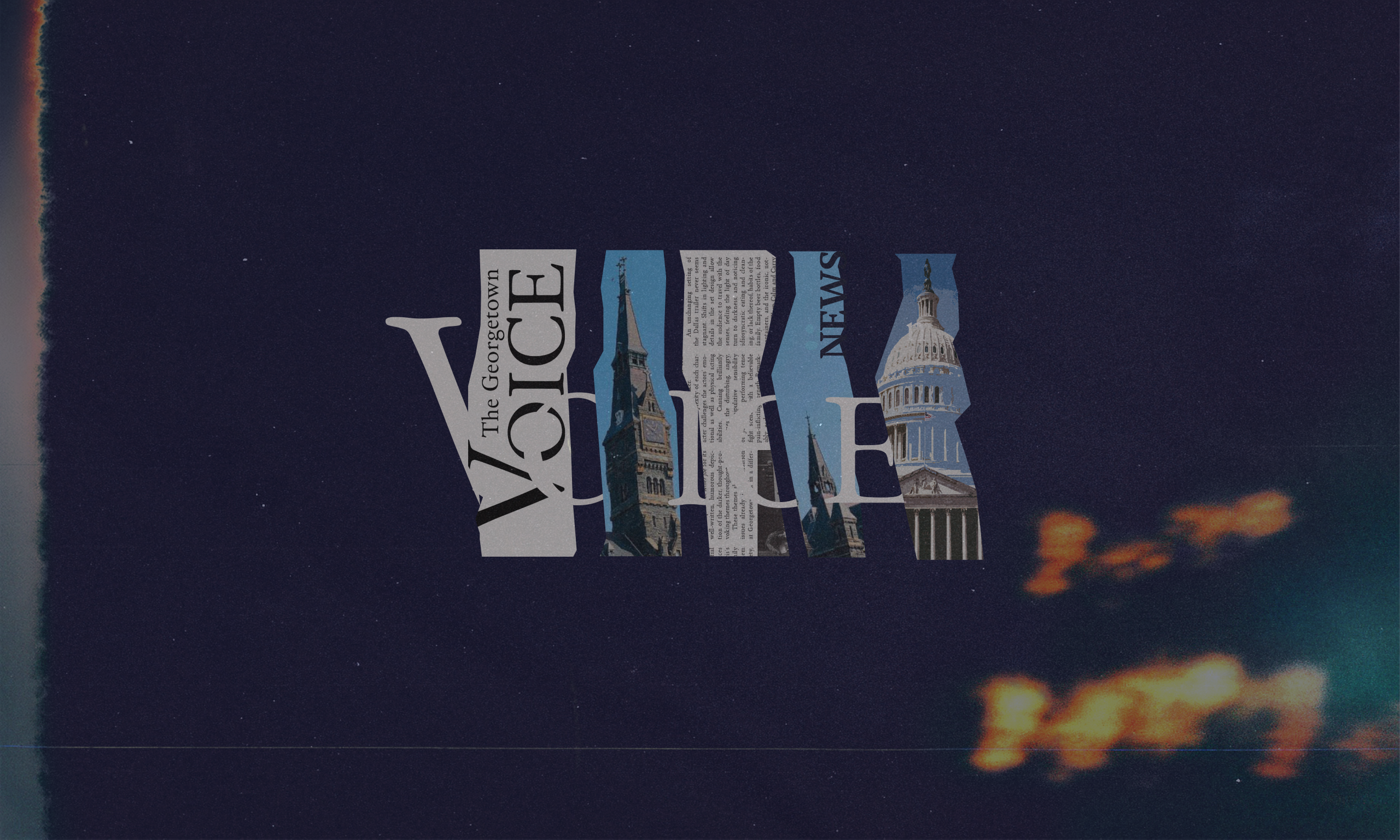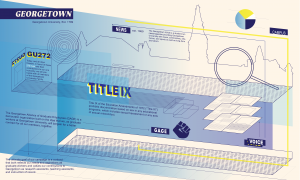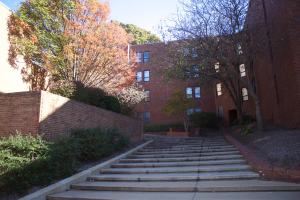CW: This article references sexual assault.
The organizers of TEDxGeorgetown are looking ahead, to a “renaissance” of new hope brought forth by a period of great adversity after two years of strife and isolation on a global scale. But how exactly have things changed, and how will they continue to change?
This spring, TEDxGeorgetown plans to explore that very question.
Under the theme of “Renaissance and Renewal”, TEDxGeorgetown will host its eleventh annual speaker series. This year’s conference invited speakers to reflect upon the fear and isolation dominating public consciousness for the past two years and to chart a path out of the pandemic. Within the broader theme, the sub-themes of ‘Sculpting Innovation’, ‘Painting A New Picture’ and “‘Writing’ Wrongs” will allow speakers to tackle this broader idea of change in the world from a variety of different perspectives.
This year’s conference boasts an impressive roster of six external speakers including Chi Ossé, an activist and New York City Council member; Christopher Bradshaw, social justice entrepreneur and executive director of Dreaming Out Loud, Inc.; Anna Marie Tendler, a multimedia artist and designer; Shon Hopwood, an appellate lawyer and associate professor at Georgetown Law Center; and Nick Cruz Velleman, official artist in residence at Georgetown Day School. As usual, TEDxGeorgetown has also invited student speakers from the Georgetown community to share the stage and take part in this thought-provoking and inspiring exchange of stories and ideas.
The Voice spoke with the six student speakers lined up for the event as they shared the “renaissance” they planned to explore during the conference.
Rebirth and the Preservation of Hope – Omar Alshogre
Public speaker and political activist Omar Alshogre (SCS ’24) has spent the years since his release from prison in Syria speaking on behalf of his fellow refugees and sharing his story with all who he can reach.
Alshogre views his own story as one of rebirth. Throughout his imprisonment, he reflected upon how he viewed faith. His entire world-view was deconstructed, and he was forced to rebuild in extreme circumstances. Alshogre shared that through his challenges, he gained a new appreciation for hope.
“Imagination and hope are crucial for human survival,” he said in an interview with the Voice.
In his talk, Alshogre plans to connect his own story to that of Tim Young, a man who has been wrongfully imprisoned and has spent the last 22 years sentenced to death in a California prison. Alshogre shared that his own hope was renewed after his conversation with Young, and he plans to use this experience to draw connections between both their stories in his speech.
Although he recognizes the relatively heavy nature of his speech, he still wants to connect with his audience on a deeper level. He believes that by focusing on the emotional difficulty of his experiences rather than the physical, his audience will see a reflection of times they have faced their own challenges.
“It’s more of making the story relevant to every person who is listening to it,” Alshogre said. “It’s not about making it extreme, it’s about making it relatable and simple for everyone.”
Alshogre acknowledged that the past two years have given many an unprecedented amount of time to themselves and have also highlighted the importance of mental health. He said that he’d like his speech to make the audience reflect upon their own experiences with emotional uncertainty.
“I want people to understand the importance of your conversation with yourself,” Alshogre said.
Enduring versus Healing – Annette O’Keefe
For a time, all Annette O’Keefe (SFS ’23) knew was how to endure. She endured her sexual assault by another student athlete. She endured a terrible car accident. She endured severe brain injury from the accident and even the near-80 percent loss of vision and debilitating pain that came with it. O’Keefe endured it all. The past two years, however, have taught her that endurance is not the key to healing.
Following her accident, O’Keefe had done her best to return to “normal.” She tried to box away the trauma she was experiencing and power through her physical therapy to return to a regular schedule of classes at Brown University. But her doctors advised against this if she wanted any hope of properly recovering.
“Ultimately those skills of compartmentalizing and carrying on, those are the skills that prevented me from healing inside and out from both my brain injury and my PTSD,” O’Keefe said.
After transferring to Georgetown, O’Keefe was able to restructure the way she handled her trauma. She was even able to repurpose her speech, which had originally been written a few years prior under the theme of mental toughness to reflect the journey she has undergone, and continues to undergo to this day.
Through sharing her story, O’Keefe wants to connect with her audience and encourage them to restructure the way they cope with trauma. Her ultimate goal is to share the root of trauma responses through a mix of research and her own anecdotal experience, but, she said, “I would love if one person resonated with even just one thing that I said, and it made them feel less alone—that would make it all worth it to me.”
Reframing Self-Perception – Olivia Henry
‘Who am I?’ is a question so often asked but rarely answered. Olivia Henry (COL ’24) has found themselves faced with this very question as they confront their identity as a mixed-race Black woman.
Henry resonated with the event’s theme as through their own journey of self-discovery, they reflect upon and renew their self-image.
“In a lot of respects, I’ve always viewed the Renaissance as a time when you have intellectual thought meeting art; it’s this time of rethinking what it even means to be human,” Henry said. “I’m at a point in my life right now where I’m rethinking what it means to be me.”
Henry also said that the pandemic played a large part in her journey. The past two years forced her to reevaluate the community and support system she had, and thus fully come to terms with her Black identity. She said this came at critical time, when awareness of racial violence was at an all time high following the murder of George Floyd. While highly emotionally taxing, this acted as the catalyst for her to consider her own identity, according to Henry.
“The pandemic was really that period of reflection, as I think it was for a lot of people, in addition to it just being a plain mental health crisis,” Henry said. “Like the pandemic, it’s not easy dealing with constant stress on your body and yoga has been a way for me to try and release a little bit of that stress.”
Henry hopes to use their story of self-discovery and renewal to connect with the audience on several levels. Part of the talk for Henry means cultivating an environment of compassion and critical self-reflection for people who may not have equivalent experiences with racial trauma. More centrally, though, they want their speech to act as a form of solace for both Black and mixed-race members of the audience who may share some of their experiences.
Ultimately, Henry’s talk is a form of self-healing—an affirmation of how yoga has been transformative to her. “Within my talk I’ll be doing a spoken word poem about what I think of as Black girl magic and really saying how yoga has allowed me to tap into that magic of existing with my melanin and my mixedness, my queerness, in a way that feels really authentic,” Henry said.
“Yoga has been that time for me to actually feel what it is to exist in my body and to really have an intimate relationship with myself.”
The Search for Unbiased Empathy – Kearney Capuano
Kearney Capuano (NHS ’24), like many others, had a strong desire to change the world when she was younger. The more she learned about its atrocities and suffering, however, the more disillusioned she grew.
Now, Capuano calls for a different, more active approach to dealing with suffering and global issues. After taking a gap year during the year of online school, she rediscovered her desire to effect change through her newfound interest in the effective altruism movement.
In delving further into the idea of effective altruism, Capuano found that people’s capacity for empathy had been greatly impacted by the collective suffering experienced over the past two years.
“I think that people’s empathy has increased in a sense that we’ve actually been able to witness others struggling,” Capuano said. “The one problem with empathy is that it’s biased.”
As she believes that empathy leads us to want to help others in situations most similar to our own, Capuano felt that there needed to be a collective shift towards a more altruistic mindset, an unbiased form of empathy. Through her speech, Capuano wants to bring attention to the problems of the world and thus promote the use of the resources available to us to actively make a difference.
“There’s this idea of moral circle expansion. We typically only fit in our own moral circle our friends and our family and our local community,” she said. “We can expand that to all humans everywhere, all animals everywhere, our entire earth and also the future generation.”
The Economics of Quitting – Trip Gorman
Throughout the pandemic, Trip Gorman (SFS ’24) believes there was a revolution in how we navigate our day-to-day decisions.
As an economics teaching assistant, Gorman became engrossed with the concepts in class and their applications to daily life. After observing a mass exodus of people from the labor force, spurred on by the general shift in perspective caused by the pandemic, he knew he wanted to take these concepts and reflect upon this change in the way people made decisions.
Gorman noted that many individuals had begun to restructure the way they made the decision to continue along a certain path or switch to a new one. By comparing this to the concept of opportunity costs and cost-benefit equations, Gorman believes he can encourage his audience to take a new approach to making difficult decisions.
“I really wanted it to be an opportunity to bring a new perspective on something, to bring together concepts and mantras that all the audience members, if they were running a business, would take into account,” he said.
Gorman also said the pandemic provided a unique opportunity for people to make decisions largely on their own without being influenced by the people around them.
“When we spent so much of our time and our free time alone during the pandemic, we got so much closer to who we really are and really made the decisions on what we want to do and how we think and what ways we want to take our life alone,” Gorman said. “That allowed us to really get to the heart of what are the costs and benefits of each sort of decision, small to big, and we really got a lot closer to what that true truth is.”
Keyboards! – Christopher Wade
On the surface, a talk about hobbies and mechanical keyboards amidst other, heavier subject matter, seems a bit out of place. Christopher Wade (COL ’24) promises, however, to elevate the instrument as a lens to view how the pandemic created permanent changes in people’s lives.
Using hobbies he curated throughout the pandemic, particularly his interest in mechanical keyboards, as a starting point, Wade aims to connect with his listeners on a deeper level through the shared passion that hobbies may inspire.
“I don’t want to give a speech about keyboards,” he said. “I want to use keyboards as a tool to relate to everyone else’s hobbies and everyone else’s passions. I want people to be able to find their passion within what I am giving as a talk.”
Through his speech, Wade wants to reflect upon what really goes into a hobby. He wants to connect to the passion behind the things we invest the most of our time in. (https://bellarinova.com/) Finally, Wade shared that he wants to inspire his audience to maintain their newfound interests beyond the alternate mode of living fostered throughout the early stages of the pandemic.
“You need to acknowledge this renewal of hobby culture and passions that we saw over quarantine,” Wade said. “The renewal has to last in order for it to truly be a renewal—otherwise it’s just a trend.”
This year’s TEDxGeorgetown will take place on March 26, 2022 in Gaston Hall.
Editor’s Note: This article was edited to better reflect the focus of Henry’s TedX talk and specify that O’Keefe’s assault was not from a member of their team.





